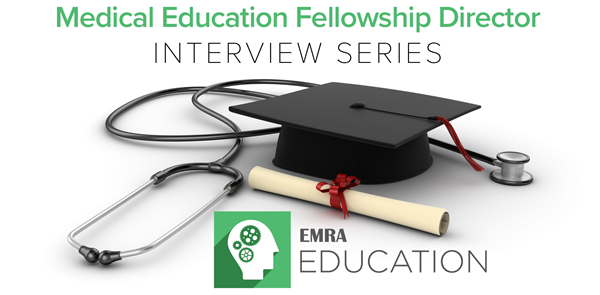The EMRA Education Committee is excited to bring you the Medical Education Fellowship Director Interview Series, which will allow Medical Education Fellowship Directors a platform to describe their fellowship program, highlight different medical education career paths, and provide resources for potential fellows.
If you are a MedEd Fellowship Director interested in submitting a profile on your program, please email EducationCtte@emra.org.
Medical Education Fellowship at Emory University
Director: Michelle Lall, MD, MHS, FACEP
Title: Residency Program Director and Medical Education Fellowship Director
Institution: Associate Professor; Director, Medical Education Fellowship
Find us online: em.emory.edu
Tell us about you and your program.
We are a one-year fellowship program. Participants will work directly with Dr. Lall but will have the ability to choose their own area(s) of focus. The fellowship is customizable and can include training in residency administration, curriculum development, lecturing, educational research, simulation, medical student education, and wellness, among other topics. Fellows will attend the ACEP teaching fellowship and CORD Navigating the Academic Waters Program. Additionally, fellows participate when available on the residency leadership team and the education committee.
How did you get involved in medical education, and what is your career path that led you to your Fellowship Director position?
I have been involved in medical education since 2009. I started as a medical student and rotating resident site director, and then I became an Assistant Residency Director prior to becoming an Associate Residency Director. I was a chief resident during residency, and that is where I first got a taste of medical education.
What are the benefits to completing a fellowship in medical education?
A medical education fellowship allows you time to develop your niche, make new contacts, and facilitates collaboration.
Does your program have a particular niche within medical education or unique aspects potential fellows should be aware of?
We offer the flexibility to work in many different education areas, including, but not limited to: SIM, remote/virtual learning, wellness, diversity, and inclusion.
What are the different career paths that fellowship graduates from your program have taken after graduation?
Recent graduates have joined academic faculty. One is now the local director of resident simulation. Another is leading our airway course and cadaver labs.
What advice do you have for residents who are just starting to get involved in medical education, especially residents who may not have a lot of resources at their own program?
There are many great programs available to residents and junior faculty. The CORD Navigating the Academic Waters track or Resident track are great places to start. SAEM-RAMS and EMRA also have a lot of offerings and collaborate with the SAEM and ACEP Education Committees (which are full of educators). Additionally, the ACEP Teaching Fellowship is a great course. There are likely more opportunities available than you realize – check with the medical school, nursing school, PA school, and NP programs in your area.
What qualities does your program look for in potential fellows?
We look for candidates who are innovative and want to hone their niche in EM.
What is the application and interview process like at your program (ie, application requirements, timeline, match process, participation in CORD universal offer day)?
We accept applications beginning in July. We ask for a CV, letter of intent, and letter of recommendation. We plan to participate in the CORD universal offer date.
What are your thoughts on the value of a master’s degree in medical education? Does your program require it or accommodate fellows who want to pursue one?
We do not require a master’s degree in medical education.
If a resident is interested in getting to know more about your program, what is the best way for them to get in touch with you?
Please visit em.emory.edu and look for the fellowship tab to see more information, or you can email Dr. Lall (michelle.d.lall@emory.edu).



